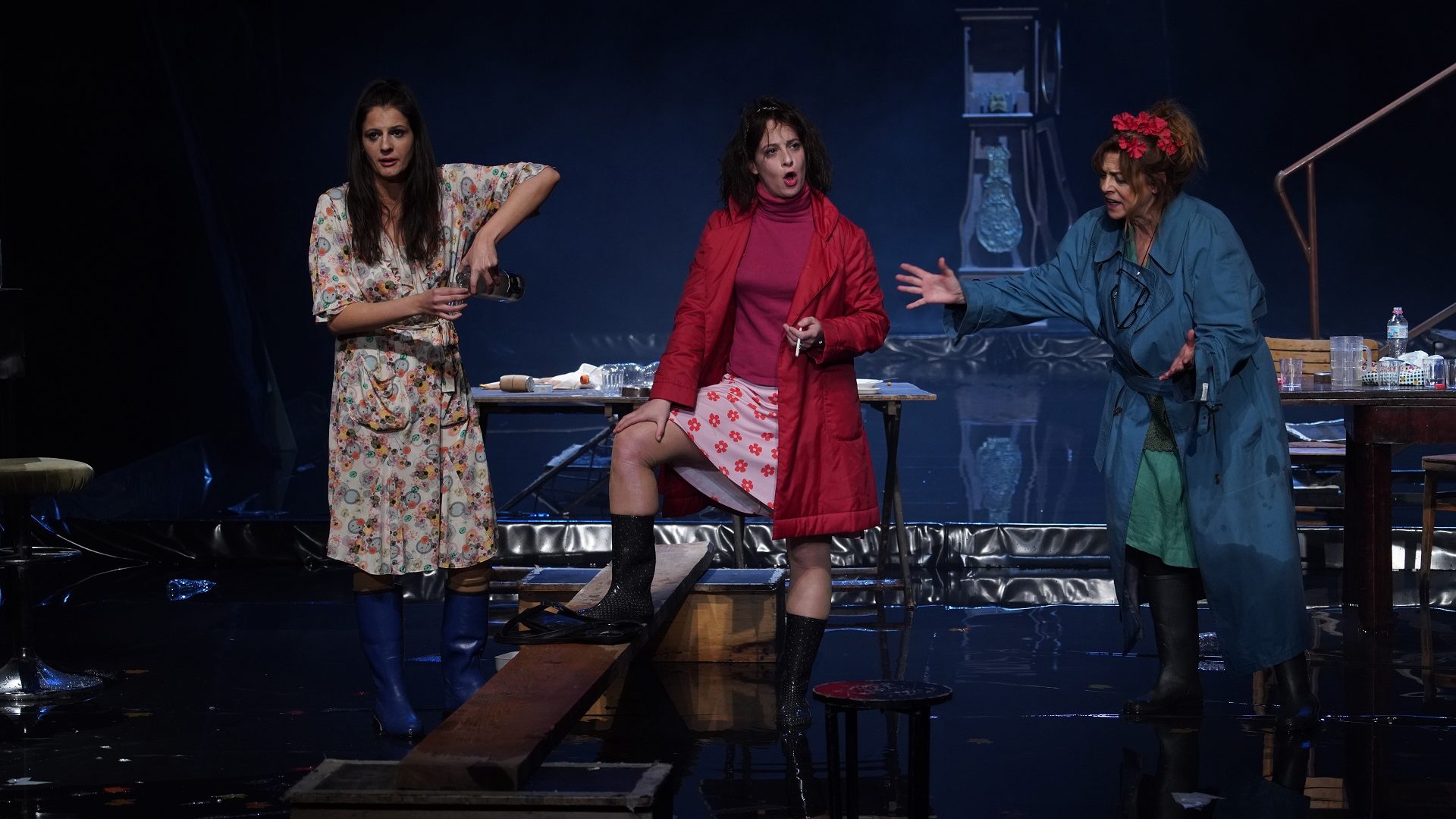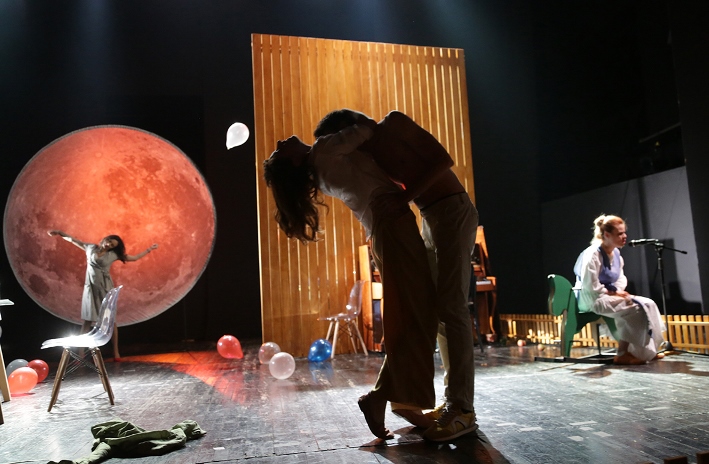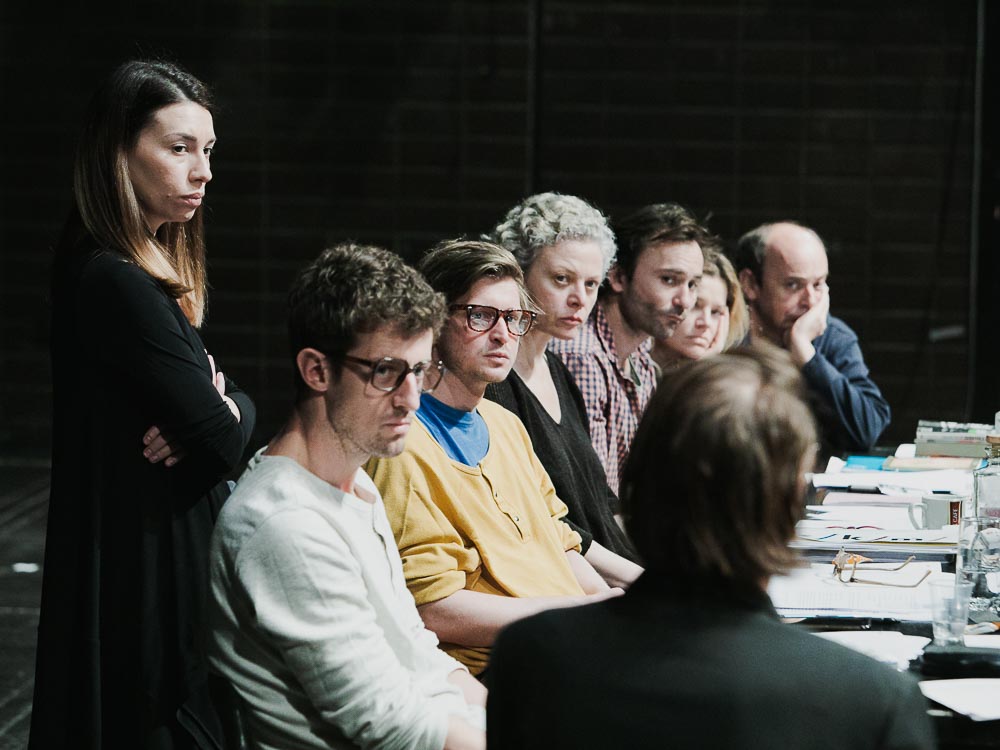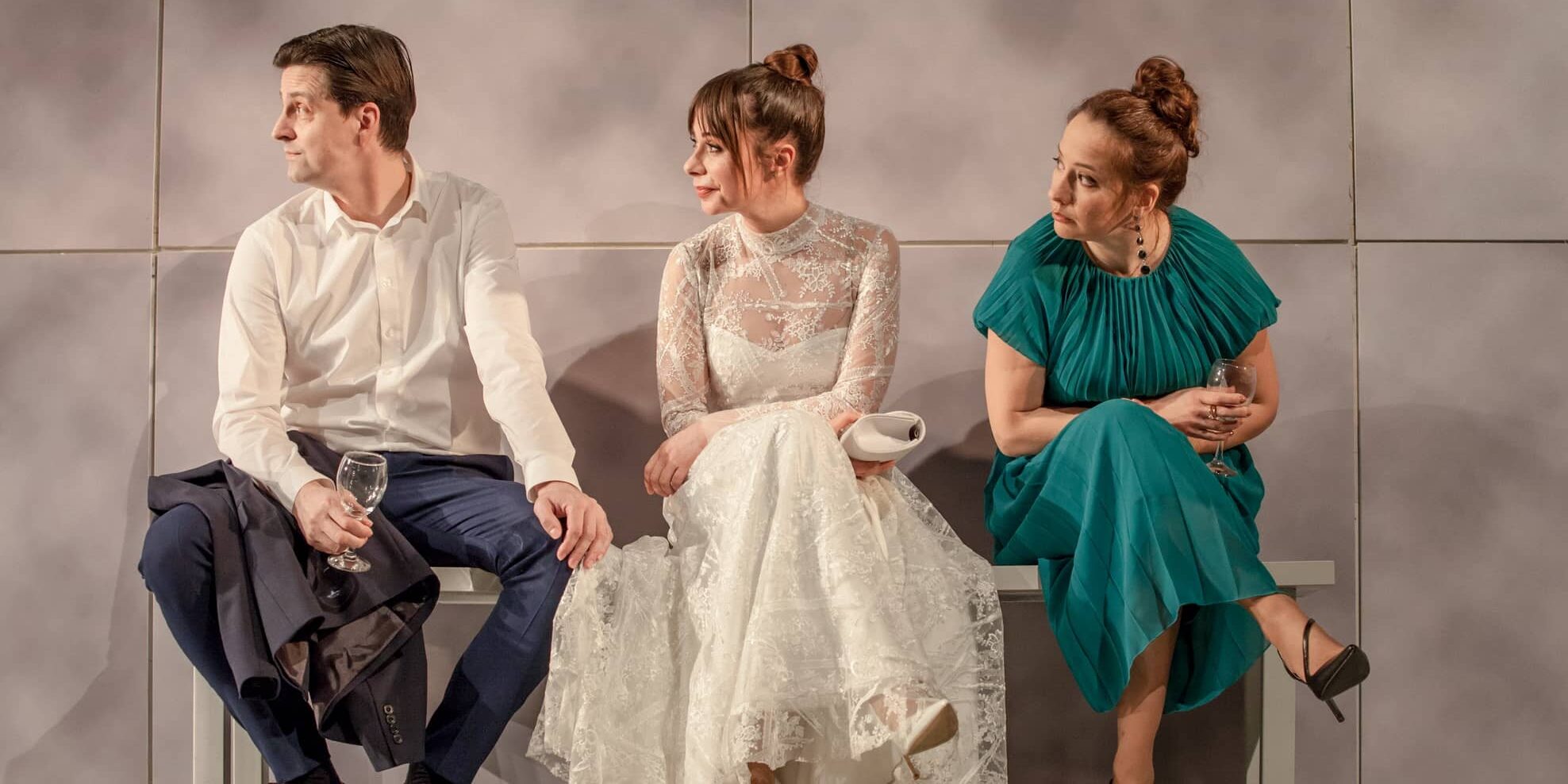The 27th Yugoslav Theater Festival took place between 1st-7th November in Užice. Andrej Čanji reports on a mixed programme which included work based on Tolstoy and Turgenev, and a powerful piece about the Holocaust from Jernej Lorenci.
The city of Užice may not be the largest in Serbia, but its cultural workers have big ambitions. Since 1996, they have run the Yugoslav Theater Festival which nurtures the memory of a country and a community that no longer exist. Maintaining such a demanding tradition is not easy for the National Theater Užice, which hosts the festival. The city of Užice and the Ministry of Culture and Information of the Republic of Serbia cover the organizational costs and these resources are not wasted. On the contrary, the audience in Užice tends to buy tickets for the entire festival before the selection has even been announced. The organizers of the festival, also maintain a friendly and exciting atmosphere, which is not always present in other similar festivals.
This year, journalist Bojan Munjin selected seven productions for the festival with a dose of pragmatism. These productions may not always be the most artistically innovative or thematically provocative, but their selection rests on a compromise between work which is more conventional and popular in its artistic approach and work that represents significant shifts in theatrical creativity.
Of the seven productions in this 2022 festival, four are from Serbia, one from Montenegro, one from Croatia and one is a co-production between Slovenia and Bosnia and Herzegovina.
Of the four productions from Serbia, three are from Belgrade. Among critics in Serbia, there is something of a consensus – Belgrade theaters are in crisis. At the Yugoslav Drama Theater, director Jagoš Marković used one of the best works of Serbian dramatic literature, Ljubomir Simović’s The Miracle in Šargan as a platform for populist sensationalism. He rejected the symbolic complexity of that piece in favour of playing with the emotions of the audience, as I outlined in my earlier review.

Cudo u Sarganu. Photo: Nebojsa Babic
The second production, Boris Lješević’s production of Tolstoy’s masterpiece War and Peace at the National Theater in Belgrade, doesn’t connect the novel with the contemporary moment. The dramatization tries to cover as many scenes from the novel as possible but fails to capture all the diversity and complexity of Tolstoy. The performance does not try to compare Russian aggression in Ukraine with the novel’s depiction of Russia during the Napoleonic wars, nor does it grapple with the philosophy of the great Russian writer. The director explores dramatic and narrative modes of expression. The actors sometimes speak as characters, in the first person, and sometimes as narrators, in the third person. They often address the audience directly. There is couple of scenes when everyone suddenly dances. Though we see most of the important characters and events from the novel, the production begs the question: why am I seeing this?
Rollercoaster, from Belgrade’s Atelie 212, is a performance based on Jelena Kajgo’s play exploring generational differences, the clash of the old and the new world. It focuses on the relationship between a conservative mother Ljiljana and her progressive daughter Anna, who marries a Jew and moves to London. The play is set in the near future, so the daughter and her family are heavily dependent on technology (they have a robot as a butler). A successful life in London, according to this piece, means giving up the values they acquired in their homeland and embracing a completely different lifestyle.
Milica Kralj’s direction is restrained and does not stand either on the side of tradition or on the side of change, but rather lets the strong female characters fight for their position on their own. The scenography by Milica Bajić Đurov represents a minimalist apartment in London, in which there are no personal, sentimental or religious features. Everything that defines the tenant’s identity is in the digital sphere, on a huge screen that stretches along an entire wall. This can be taken as a symbol of the depersonalized modern man. On the other hand, the sterile scenography makes it possible to highlight the personalities of the characters. Rollercoaster explores an ever-current social dilemma but offers little relation to it. That said, it still provides much more than the other two performances from Belgrade, which miss the opportunity to make themselves relevant in any artistic or political sense.

Mesec (dana) na selu
The fourth Serbian production is from the National Theater Užice, which hosts the festival and bolsters my thesis that the best theatre in the country comes from outside Belgrade. Director Milan Nešković and playwright Jelena Mijović significantly shorten Ivan Turgenev’s play A Month in the Country and they put a twist on their interpretation of this classic by placing it in the thematic framework of class tension, a topic which is rarely addressed on the Serbian stage.
It begins with a dynamic change of short stage etudes that mark the passage of time in the boring, idle and extremely privileged life of Natalya Petrovna (Bojana Zečević), her family and friends. One servant (Tijana Karajičić Radojičić) and one companion (Ivana Pavićević) ensure their comfort. While the characters of a privileged position take turns in the scenes to fall in love, argue, debate, enjoy, rejoice, suffer and grieve, the two servants are on the stage present during the entire performance. No one asks them anything; they seem to have no activities, desires, thoughts or feelings that do not concern the life of their employers.
These dynamic relationships are directed in a playful, lively and witty style. Nešković succeeds in this primarily because he has a dedicated and gifted ensemble at his disposal. The backbone of his process is the duplication of perspective. In the foreground, literally closer to the audience, love plots arise around a rich and idle woman, while in the background; the maid and companion are struggling. Although these two characters are insignificant roles in Turgenev’s play, their presence in this production is impressive. They are secondary characters in the love plot, but in some sense, they are the main roles.
The Podgorica City Theater and the Bar Summer Festival presented Stevan Koprivica’s comedy Without Portfolio. The author was influenced by the most famous Serbian comedy writer Branislav Nušić and his play The Cabinet Minister’s Wife. A man becomes a minister, and his wife provides high positions in state institutions for the family members, friends and acquaintances.
Branislav Mićunović’s direction is static, and the symbolism is rather banal. The actors deliver their lines to the front regardless of whether they are standing or sitting – they are always facing the audience, often using a microphone. The communication between the characters takes the form of repetitive rhetorical tirades, while music from the movie Titanic underlines the fact this is a corrupt situation that can’t be salvaged. The scenography by Marko Patrović-Njegoš also suggests that a society ruled by incompetence will sink and end with nothing.
Lina Leković’s costume design emphasizes the transformation of these upstarts who have mastered public relations and learned to flirt gracefully in front of the media: the actors at first wear black or grey suits, then change to colour after gaining jobs in the state institutions.
When the nepotism and corruption are exposed, the responsibility falls on one minister, while everyone else keeps their positions. Mićunović shows the symbolism of the naked system in a painfully obvious way – by stripping the figure of the minister naked. The performance contains a defeatist statement that everything is so hopeless that we can only give up. If everyone is equally corrupt and prone to evil, as the character of the minister explicitly tells us, then any political activity becomes meaningless. The authors may think this play is criticizing the existing social order, but in essence, they have succumbed to cynicism.
Yugoslavia, My Homeland, is a co-production of Prijedor Theater and Koper Theatre. It is based on Slovenian writer Goran Vojnović’s novel about a son’s search for the father who is hiding because of issued warrant by the International Criminal Tribunal. His father is wanted on suspicion of having committed war crimes near Vukovar during the war in the 1990s. The desire to learn more about his dad, his origins and himself, drives the main character on a path into the past. Director Marko Misirača pays the greatest attention to transitions from the present to the past. These changes happen easily and unobtrusively, and at the same time clearly and precisely so that there is no confusion about where and when something happens.
The framing device of the son’s search happens in a serious, dramatic register, while the reminiscences of life in Yugoslavia take a light, comical tone, which sometimes unnecessarily turns into caricature. This creates a double perception of history – the easy and carefree atmosphere in which people lived in socialist Yugoslavia and the tragic, tense retrospect from which we look at that same past today. The performance begins with a factual gesture. The actors introduce themselves by name and state when they took the pioneer oath. Almost the entire ensemble took the oath, while the main actor did not. Actors’ biographies become stage signs suggesting that fictional stage events have strong connections with reality.
Unfortunately, this initial gesture is not developed; it remains a lonely attempt and a missed opportunity to implement a consistent and exciting interweaving of art and reality. The theme of war, disintegration, destroyed lives, recurrence of the past, and the impact of those events on modern life in this production acts more as a means to tell a fictional family saga in a dramatic way, which only coincidentally has strong ties to a turbulent history.
The authors don’t appear to treat the subject of war crimes and the impact they had on society seriously. This omission is even greater when they made this production in a region where many people publicly deny and relativize war crimes.

Eichmann in Jerusaem at Zagreb Youth Theatre
Jernej Lorenci’s production of Eichmann in Jerusalem for the Zagreb Youth Theatre does the exact opposite. The performance speaks about the horrors of the Holocaust. Instead of a literary work to which all expressive elements of the performance are subordinated, Lorenci works in collaboration with his actors. The collective focused their research on the book by Hannah Arendt from which the production takes its name, the novel The Skin by Curzio Malaparte, Karl Jaspers’ study The Question of German Guilt, and the film Shoah by Claude Lanzmann. Common to all these materials is an examination of the greatest evil committed by humankind. It This is also the kind of literature to which the average person in a consumerist society will never pay the necessary amount of attention. However, this topic must be the object of our attention and Lorenci and his team clearly thought that the theatre could be a perfect medium for that.
The Zagreb Youth Theater is a socially engaged institution and Eichmann in Jerusalem is one of its crown jewels, produced in 2019, at a time when, in the Croatian public sphere, you could hear statements that relativized the war crimes in Jasenovac.
The performance has two parts. The first deals with the trial of Adolf Eichmann, a Nazi, while in the second part the same procedure applies to Andrija Artuković, an Ustasha war criminal. The actors do not play dramatic characters, but function as analysts and transmitters of content. They express their own views through brilliant performance. Occasionally they portray the characters of monsters and their victims, but mainly they speak for themselves and describe their relationship with the material that was the subject of their research.
The creators of Eichmann in Jerusalem are ready to sacrifice the entertaining aspects of theatrical expression for the sake of the message they want to convey. The result is a very disturbing performance and not something you watch lightly. But this production addresses something we all need to hear, no matter how uncomfortable it is. If we do not face the past and our own pains and if we stop cultivating a cultural memory, we put ourselves in danger of repeating the evil, and then we have failed as individuals, as a community, as people.
Main image: Rollercoaster at Atelje 212
For more information visit jpf.uziskopozorite.rs
Further reading: review of The Miracle in Šargan
Further reading: 67th Sterinjo Pozorje – a critical dialogue
Andrej Čanji is a theatre critic and theatrologist based in Belgrade.








